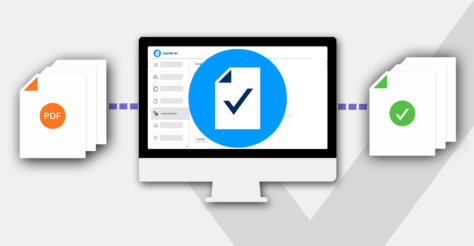
Recent developments in artificial intelligence (AI), particularly machine learning and computer vision, have made it possible to automate many time-consuming manual tasks in PDF accessibility. You might be familiar with Equidox Software. Equidox Software incorporates AI to automate time-consuming parts of remediation such as tagging lists and tables. It is so easy to use that you don’t even need any accessibility experience.
But if your organization has hundreds, thousands, or millions of PDF pages to make accessible, you may need an even better solution. Building cutting-edge automated features for Equidox Software led our team to question whether it was possible to fully automate the PDF remediation process. This led to the development of Equidox AI, our fully automated PDF accessibility solution.
Creating a fully automated PDF accessibility solution
Equidox AI was created from a collaboration of Equidox data scientists, developers, and PDF accessibility experts. The solution is designed to make PDF accessibility for high-volume, templated PDFs as easy as a few clicks, no matter how many pages need to be remediated. This solution is for repetitive, similarly structured documents produced en masse. Beyond volume, many of these documents are difficult to remediate because each one may have elements like icons, tight columns, graphs, tables, and other components that make tagging even a single document time-consuming. Equidox AI automates tagging all of those elements. It has a number of potential use cases that can save both time and money for organizations facing the challenges of making many, many, many PDF pages accessible.
But where is this technology applicable?
Equidox AI Use Cases
Statements
Many organizations use PDF statements to provide customers with a list of transactions or other customer-specific information. While the setup of documents for each customer is the same within a batch, many elements will vary based on the individual transactions. The sheer quantity and complexity of statements many organizations produce makes manual tagging difficult or impossible, but automated PDF accessibility makes it easy. These include:
- Customer invoices
- Financial statements
- Billing statements
- Recurring reports
Directories
These are public-facing documents produced by many organizations to provide information to their customers. They are regularly updated and often come in regional and/or language variations but are similar in appearance and content, with repetitive graphics that AI models can be trained to identify. They are often very large and can change frequently, making manual tagging impractical. Examples of these PDFs might include:
- Physician’s directories
- Service providers
- Prescription drug formularies
Customer Communications
Other customer communications also must be accessible. Many organizations produce batches of documents that are formatted alike but contain information that is personalized for each customer. Again, manual remediation would be impractical or impossible, and outsourcing could put sensitive customer information at risk. Other recurring customer documents that organizations might provide are:
- Policy updates
- Explanations of Benefits
- Treatment plans
- Expense estimates
- Tax documents
- Security alerts
Many other documents may be produced in large quantities, often very similar in structure and content. These are ideal for automated PDF accessibility with Equidox AI as they provide a large number of samples that make it easy to accurately train AI models. Manually remediating, or paying to send these documents to a vendor for remediation, is both time- and cost-prohibitive.
Accessibility is mandated
All of these types of recurring PDF documents must be provided to customers. Further, they must meet digital accessibility standards for the Americans with Disabilities Act (ADA) Section 508 of the Rehabilitation Act, and Section 1557 of the Affordable Care Act. In addition to these federal regulations, there are also specific regulations for digital accessibility in a number of states, including California, New York, Florida, Illinois, Massachusetts, and Colorado. These laws apply if you are doing business in any of these states, regardless of whether your organization is located or incorporated there.
How automated PDF accessibility works
Many automated accessibility tools aren’t fit for purpose. Auto-tagging, such as what is offered by Adobe, doesn’t always get tagging right. Accessibility overlays for websites are notoriously ineffective and, according to assistive technology users, cause more issues than they solve. So how is Equidox AI different?
Equidox AI doesn’t use static definitions to tag PDF elements such as text, images, headings, lists, tables, or links. It is only effective if the documents it is remediating are high-volume and similar in structure and content.
This is because the solution operates by model training. Equidox collects sample documents from among the large quantities of PDFs needing to be made accessible, and they are analyzed by our data scientists. They custom-program each AI model to correctly tag each batch of PDFs. Once the model has been trained and thoroughly tested, it can be trusted to apply digital tags for accessibility to each and every PDF in a given batch with a high degree of accuracy.
Are your PDFs right for Equidox AI?
- Do you have a large quantity of repetitive, similarly-formatted, or templated PDFs?
- Do you update or produce them regularly?
- Are you looking for a better way to make PDFs accessible than outsourcing, taking up staff time, or ignoring accessibility?
Schedule a free consultation with Equidox PDF accessibility experts and we’ll help you figure out the best way to make your PDFs accessible and compliant. Or check out our eBook on automated PDF accessibility to learn more.
Tammy Albee
Tammy Albee | Director of Marketing | Equidox Tammy joined Equidox after four years of experience working at the National Federation of the Blind. She firmly maintains that accessibility is about reaching everyone, regardless of ability, and boosting your market share in the process. "Nobody should be barred from accessing information. It's what drives our modern society."